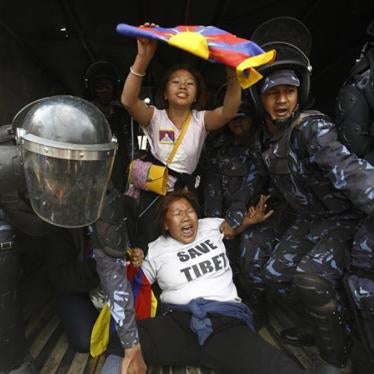(New York) – In spite of the new coalition government pledging to uphold long overdue promises of justice, accountability, and a new constitution, the Nepali government made virtually no discernable progress in any of these areas, Human Rights Watch said today in its World Report 2015. Political parties failed to break a years-long deadlock on promulgating a new constitution, and seemed intent on ensuring ongoing impunity for war crimes.
“It is deeply disappointing that Nepal remains stuck in the same place it has been for years in spite of the grand promises made after the end of the civil war,” said Brad Adams, Asia director at Human Rights Watch. “The state appears determined to ensure that there is no accountability, leaving victims with no hope for justice.”
In the 656-page world report, its 25th edition, Human Rights Watch reviews human rights practices in more than 90 countries. In his introductory essay, Executive Director Kenneth Roth urges governments to recognize that human rights offer an effective moral guide in turbulent times, and that violating rights can spark or aggravate serious security challenges. The short-term gains of undermining core values of freedom and non-discrimination are rarely worth the long-term price.
In May 2014, Nepal’s assembly enacted a law establishing the Commission on Investigation of Disappeared Persons, Truth, and Reconciliation to investigate serious rights violations and abuses committed during Nepal’s decade-long civil war from 1996 to 2006. However, the law largely replicates a previous version that was struck down as unconstitutional by the Supreme Court, and has been criticized by local and international groups as an attempt to ensure that perpetrators get amnesty and freedom from prosecution. Three public interest litigations have been filed before the Supreme Court challenging this legislation, but the government announced that it would proceed to establish these commissions before the end of 2014.
Nepal continued its crackdown on minorities in 2014. The government imposed strict restrictions on peaceful protests by Tibetan refugees, forbidding them to publicly celebrate the Dalai Lama’s birthday or the Tibetan new year. Buddhist religious sites and monasteries are openly under government surveillance. Human Rights Watch reiterated its call on the Nepali government to allow the Tibetan community in Nepal the rights to free expression and assembly.
Human Rights Watch expressed deep concern that an estimated 4 million people continued to be denied citizenship due to flawed laws. This denial leaves this population without access to basic rights. The law makes it particularly difficult for women to secure legal proof of citizenship, especially when male family members refuse to assist them or are unavailable to do so, and it effectively denies citizenship to children of non-Nepali fathers.
“Nepal’s inability to move forward on a new constitution has stalled efforts to ensure protection of the rights of minorities and to reform flawed laws and practices,” Adams said. “Both for the victims of the conflict and for the millions of other vulnerable communities who continue to suffer unjustly, the government must honor its pledges without further delay.”







